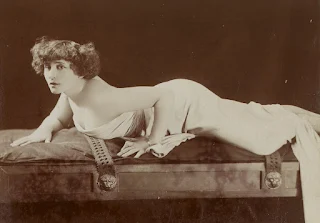This year – this shitty shitty year – opened in France on a hopeful note: it was the 150th anniversary of Colette. Everybody party!
So I
dutifully decided to buckle down to Colette.
However,
Colette is a writer who exists not to give you a buckle down experience, but an
unbuckled one. And certain of her more famous novels – like the Cheri – make me
a little nervous. Like the famous Maurice Chevalier song, Thank Heaven, for
Little Girls, there’s the perv undercurrent here.
Yet it is
true that, once you discard this, and once you appreciate that Colette had,
very much pre-social media, a strong sense of the self as selfie, you can
surrender to the wonderful French. I have been reading La naissance du jour, a
book from Colette’s second phase. Her first phase, or so the Colette-ologists
tell me, begins with the legendary story of how she discovered writing up
through Cheri, in 1920.
Colette
came out of the demimonde. It is hard to find a
parallel to her career in the Anglophone world. Jean Rhys is a sort of
parallel, but not very. Imagine a softcore actress from some ludicrously
lecherous Showtime series becoming one of the greatest American writers – that
is the sort of the thing that happened with Colette.
Married to an unbelievably disgusting man,
“Willy”, who was an impresario of a stable of writers all churning out “sexy”
novels for the market in the first decade of the 20th century, she was, as
legend has it, locked in her room until she turned out her first Claudine
novel. She gave Willy what he deserved as he kept coming home with younger and
younger women he'd seduced – a divorce. Also, she made his posterity in a
series of later description in her autobiographical writings where he writhed
like a worm on her hooked prose (hey, I wrote it, I stand by it!). After Willy,
to pay the bills and for the hell of it,
she became a dance hall performer, took for a lover a woman named Missy,
la marquise de Morny, and staged a play with her, the Egyptian dream, where she
gave her a French kiss at the end – which was too much for even the Moulin
Rouge crowd.
Did I
mention she performed topless?
Colette
is a strong contrast with, say, Marianne Moore, although they were both, in
their own ways, exhibitionists. Hell, can you write and not be an
exhibitionist? Even Emily Dickenson, even Fernando Pessoa, were, when all is
said and down, showing and telling.
The
biography naturally lights up the writing, and not in a bad way – so often, in
French lit, writing well and being, outside the text, a Grade A asshole go
together. Need I mention Celine? It is a
standard that certain American writers, like John Updike, strove to emulate.
But they just didn't have the style, although Updike descibing himself
masturbating some women in the back seat while his wife in the front seat was
driving does, well, get some sort of prize.
Colette
is, on the contrary, a likeable working woman. Of genius.
Here is a
passage from the NdJ:
« Elle a donc pu, elle, se pencher impunément sur la
fleur humaine. Impunément sauf la « tristesse » – appelait-elle tristesse ce
délire mélancolique, cet ennoblissement qui nous soulève à la vue de
l’arabesque jamais pareille à elle-même, jamais répétée, – feux couplés des
yeux, calices jumeaux, renversés, des narines, abîme marin de la bouche et sa
palpitation de piège au repos – la cire perdue des visages ?… Penchée sur une
créature enfantine et magnifique, elle tremblait, soupirait d’une angoisse qu’elle
ne savait nommer, et qui se nomme tentation. »
So much
of this, like so much of Henry James, seems, out of its framing here, merely
ordinary. Colette uses magnifique often to speak of bodies, but its coupling –
and everything is coupled here – with enfantine renews its sense: the selfie
becomes self. As for the phrase, « abîme marin de la bouche et sa
palpitation de piège au repos », well, Nabokov eat your heart out.




No comments:
Post a Comment